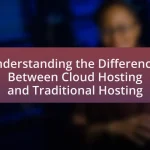Dedicated servers are essential for e-commerce success, providing enhanced performance, security, and reliability for online businesses. They enable e-commerce websites to manage high traffic volumes efficiently, ensuring fast loading times and a positive user experience, which are critical for customer retention and conversion rates. Additionally, dedicated servers offer robust security features that protect sensitive customer data and transactions, fostering consumer trust. The article explores how dedicated servers support e-commerce platforms, their key features, the impact on website performance and security, and the cost implications, ultimately highlighting their significance in driving sales and customer loyalty.
What is the role of dedicated servers in e-commerce success?
Dedicated servers play a crucial role in e-commerce success by providing enhanced performance, security, and reliability for online businesses. These servers ensure that e-commerce websites can handle high traffic volumes without compromising speed or user experience, which is vital for customer retention and conversion rates. Additionally, dedicated servers offer robust security features, protecting sensitive customer data and transactions from cyber threats, thereby building trust with consumers. According to a study by Statista, 79% of online shoppers who experience a performance issue are less likely to return to the site, highlighting the importance of dedicated servers in maintaining optimal website functionality.
How do dedicated servers support e-commerce platforms?
Dedicated servers support e-commerce platforms by providing enhanced performance, security, and reliability. These servers offer dedicated resources, ensuring that e-commerce websites can handle high traffic volumes without slowdowns, which is crucial during peak shopping periods. Additionally, dedicated servers allow for advanced security measures, such as firewalls and DDoS protection, safeguarding sensitive customer data and transactions. According to a study by Statista, 75% of consumers are concerned about online security, highlighting the importance of robust security features in e-commerce. Furthermore, dedicated servers facilitate better uptime and availability, with many providers offering Service Level Agreements (SLAs) that guarantee 99.9% uptime, ensuring that online stores remain accessible to customers at all times.
What are the key features of dedicated servers that benefit e-commerce?
Dedicated servers provide several key features that significantly benefit e-commerce, including enhanced performance, improved security, and greater customization. Enhanced performance is achieved through dedicated resources, which ensure faster loading times and better handling of high traffic volumes, crucial for maintaining customer satisfaction and reducing cart abandonment rates. Improved security is a critical feature, as dedicated servers offer advanced security measures, such as firewalls and DDoS protection, which safeguard sensitive customer data and transactions. Greater customization allows e-commerce businesses to tailor server configurations to their specific needs, optimizing applications and databases for better efficiency. These features collectively contribute to a more reliable and efficient e-commerce platform, ultimately driving sales and customer loyalty.
How do dedicated servers enhance website performance for online stores?
Dedicated servers enhance website performance for online stores by providing exclusive resources that improve speed, reliability, and security. With dedicated servers, online stores benefit from higher bandwidth and processing power, which allows for faster loading times and the ability to handle increased traffic without performance degradation. For instance, a study by Google found that a one-second delay in page load time can lead to a 20% decrease in conversions, highlighting the importance of speed in e-commerce. Additionally, dedicated servers offer enhanced security features, reducing the risk of data breaches and downtime, which are critical for maintaining customer trust and operational continuity.
Why are dedicated servers crucial for e-commerce security?
Dedicated servers are crucial for e-commerce security because they provide a high level of control and customization over security measures. This control allows businesses to implement tailored security protocols, such as firewalls, intrusion detection systems, and secure payment gateways, which are essential for protecting sensitive customer data. According to a study by the Ponemon Institute, 60% of small businesses that experience a data breach go out of business within six months, highlighting the importance of robust security measures. Dedicated servers also reduce the risk of shared vulnerabilities that can occur in shared hosting environments, ensuring that e-commerce platforms are less susceptible to attacks.
What security measures do dedicated servers provide for e-commerce transactions?
Dedicated servers provide several security measures for e-commerce transactions, including enhanced data encryption, dedicated firewalls, and isolated environments. Enhanced data encryption ensures that sensitive information, such as credit card details, is securely transmitted and stored, reducing the risk of data breaches. Dedicated firewalls protect against unauthorized access and cyber threats by filtering incoming and outgoing traffic based on predetermined security rules. Additionally, the isolated environment of dedicated servers minimizes the risk of cross-contamination from other users, which is common in shared hosting scenarios. These measures collectively contribute to a more secure online shopping experience, safeguarding both customer data and business integrity.
How do dedicated servers protect customer data in online shopping?
Dedicated servers protect customer data in online shopping by providing enhanced security features and dedicated resources. These servers offer isolation from other users, reducing the risk of data breaches that can occur in shared hosting environments. Additionally, dedicated servers can implement advanced security protocols such as firewalls, intrusion detection systems, and SSL certificates, which encrypt sensitive information during transactions. According to a study by the Ponemon Institute, organizations using dedicated servers experience 50% fewer data breaches compared to those using shared hosting solutions, highlighting the effectiveness of dedicated servers in safeguarding customer data.
What impact do dedicated servers have on e-commerce scalability?
Dedicated servers significantly enhance e-commerce scalability by providing dedicated resources that can handle increased traffic and transactions. This dedicated infrastructure allows e-commerce platforms to maintain high performance during peak times, such as sales events or holiday seasons, where user demand surges. For instance, a study by HostingAdvice found that dedicated servers can improve website loading speeds by up to 50%, which is crucial for retaining customers and reducing bounce rates. Additionally, dedicated servers offer greater customization and control over server configurations, enabling businesses to optimize their environments for specific applications and workloads, further supporting scalability.
How can dedicated servers accommodate growing e-commerce traffic?
Dedicated servers can accommodate growing e-commerce traffic by providing dedicated resources that ensure optimal performance and reliability. Unlike shared hosting, dedicated servers allocate all their resources—CPU, RAM, and bandwidth—to a single user, which allows for faster load times and the ability to handle high volumes of concurrent users. This is crucial for e-commerce platforms, especially during peak shopping seasons, as studies show that a one-second delay in page load time can lead to a 7% reduction in conversions. Additionally, dedicated servers offer enhanced security features, which protect sensitive customer data and build trust, further supporting e-commerce growth.
What are the limitations of shared hosting compared to dedicated servers for e-commerce?
Shared hosting has several limitations compared to dedicated servers for e-commerce, primarily in performance, security, and customization. Shared hosting environments allocate server resources among multiple users, which can lead to slower website loading times and reduced performance during high traffic periods. In contrast, dedicated servers provide exclusive resources, ensuring optimal performance for e-commerce sites, especially during peak shopping seasons.
Security is another critical limitation; shared hosting is more vulnerable to security breaches since multiple websites share the same server. If one site is compromised, others can be at risk. Dedicated servers offer enhanced security features, including firewalls and dedicated IP addresses, which are crucial for protecting sensitive customer data in e-commerce transactions.
Customization options are also limited in shared hosting, as users cannot modify server settings or install specific software that may be necessary for their e-commerce applications. Dedicated servers allow full control over the server environment, enabling businesses to tailor their hosting solutions to meet specific operational needs and compliance requirements.
These limitations highlight why many e-commerce businesses opt for dedicated servers to ensure better performance, security, and flexibility.
How do dedicated servers influence customer experience in e-commerce?
Dedicated servers significantly enhance customer experience in e-commerce by providing improved performance, reliability, and security. With dedicated servers, e-commerce websites can handle higher traffic volumes without slowdowns, ensuring that customers experience fast loading times, which is crucial for retaining users and reducing bounce rates. According to a study by Akamai, a one-second delay in page load time can lead to a 7% reduction in conversions. Additionally, dedicated servers offer enhanced security features, such as firewalls and DDoS protection, which safeguard customer data and build trust. This trust is essential, as a survey by PwC found that 32% of consumers would stop doing business with a brand they loved after just one negative experience, highlighting the importance of a secure and reliable online shopping environment.
What role does server speed play in customer satisfaction for online shoppers?
Server speed is crucial for customer satisfaction among online shoppers, as it directly impacts website loading times and overall user experience. Research indicates that a one-second delay in page load time can lead to a 7% reduction in conversions, highlighting the importance of fast server response times. Additionally, a study by Akamai found that 53% of mobile site visitors abandon a page that takes longer than three seconds to load. Therefore, faster servers enhance user engagement, reduce bounce rates, and ultimately contribute to higher customer satisfaction and increased sales.
How do dedicated servers affect website uptime and reliability?
Dedicated servers significantly enhance website uptime and reliability by providing exclusive resources and optimized performance. Unlike shared hosting, where multiple websites compete for bandwidth and server resources, dedicated servers allocate all available resources to a single website, minimizing the risk of downtime due to traffic spikes or resource limitations. This exclusivity leads to improved load times and consistent performance, which are critical for maintaining user engagement and satisfaction. According to a study by the Hosting Tribunal, websites on dedicated servers experience up to 99.99% uptime, compared to lower percentages for shared hosting environments. This high level of reliability is essential for e-commerce success, as even minor downtime can result in lost sales and diminished customer trust.
What are the cost implications of using dedicated servers for e-commerce?
Using dedicated servers for e-commerce incurs higher costs compared to shared hosting solutions, primarily due to the exclusive resources and enhanced performance they provide. Dedicated servers typically involve expenses such as hardware acquisition, maintenance, and higher monthly fees, which can range from $100 to over $500 depending on the specifications and service provider. Additionally, businesses may face costs related to security measures, backup solutions, and technical support, which are crucial for maintaining uptime and protecting sensitive customer data. These investments can lead to improved website speed, reliability, and security, ultimately enhancing customer experience and potentially increasing sales.
How do dedicated server costs compare to other hosting options for e-commerce?
Dedicated server costs are generally higher than shared or VPS hosting options for e-commerce. While shared hosting can start as low as $5 to $10 per month and VPS hosting typically ranges from $20 to $100 per month, dedicated servers usually begin around $100 and can exceed $500 per month depending on specifications. This cost difference is due to dedicated servers providing exclusive resources, enhanced performance, and greater security, which are crucial for handling high traffic and sensitive customer data in e-commerce. According to a 2021 report by HostingAdvice, businesses that require robust performance and reliability often find that the investment in dedicated servers pays off through improved site speed and uptime, leading to better customer experiences and potentially higher sales.
What factors should businesses consider when budgeting for dedicated servers?
Businesses should consider hardware specifications, bandwidth requirements, and maintenance costs when budgeting for dedicated servers. Hardware specifications, including CPU power, RAM, and storage capacity, directly impact server performance and scalability, which are crucial for handling e-commerce traffic. Bandwidth requirements are essential to ensure that the server can manage data transfer without latency, especially during peak shopping times. Maintenance costs, including technical support and potential upgrades, should also be factored in, as they can significantly affect the total cost of ownership over time.
What best practices should e-commerce businesses follow when using dedicated servers?
E-commerce businesses should prioritize security, performance optimization, and regular maintenance when using dedicated servers. Implementing robust security measures, such as firewalls and SSL certificates, protects sensitive customer data and builds trust. Performance optimization techniques, including load balancing and caching, enhance website speed and user experience, which are critical for retaining customers. Regular maintenance, such as software updates and monitoring server health, ensures reliability and minimizes downtime. According to a study by Akamai, a 100-millisecond delay in website load time can decrease conversion rates by 7%, highlighting the importance of performance in e-commerce success.
How can businesses optimize their dedicated server settings for better performance?
Businesses can optimize their dedicated server settings for better performance by fine-tuning resource allocation, enhancing security configurations, and implementing performance monitoring tools. Fine-tuning resource allocation involves adjusting CPU, RAM, and storage settings to match the specific needs of applications, which can lead to improved processing speeds and reduced latency. Enhancing security configurations, such as optimizing firewall settings and regularly updating software, helps prevent downtime caused by security breaches, thus maintaining consistent performance. Implementing performance monitoring tools allows businesses to track server metrics in real-time, enabling proactive adjustments to settings based on usage patterns and performance bottlenecks. These strategies collectively contribute to a more efficient and responsive server environment, essential for e-commerce success.
What common troubleshooting tips can help maintain dedicated servers in e-commerce?
Common troubleshooting tips for maintaining dedicated servers in e-commerce include regular software updates, monitoring server performance, implementing robust security measures, and conducting routine backups. Regular software updates ensure that the server operates with the latest features and security patches, reducing vulnerabilities. Monitoring server performance helps identify issues such as high CPU usage or memory leaks, allowing for timely interventions. Implementing robust security measures, such as firewalls and intrusion detection systems, protects against cyber threats, which are critical in e-commerce environments. Routine backups safeguard data against loss, ensuring business continuity. These practices are essential for maintaining server reliability and performance, which directly impacts e-commerce success.










